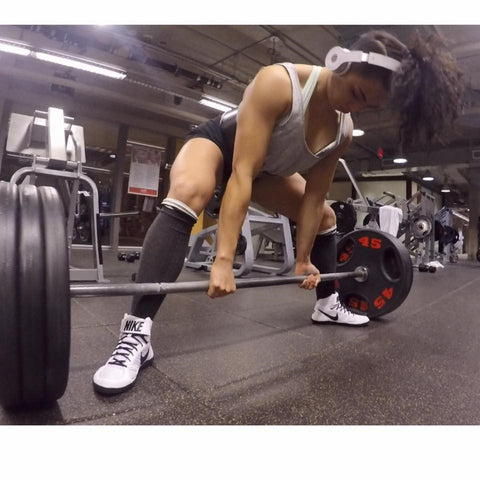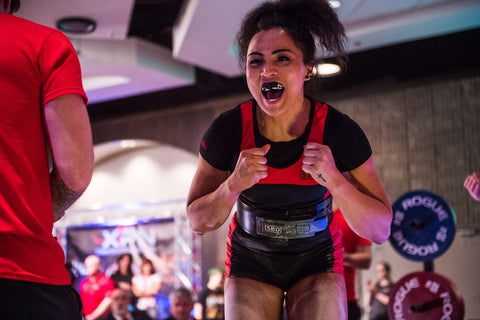The 22 Hours Outside of the Gym
by Christine Castro
We are often asked about how our training is going and how well we did at our last meet; although powerlifters spend on average 2 hours a day training (or maybe more since us, powerlifters, love our rest in between sets, right?) what we don’t get asked much about is how we spend the other 22 hours outside of the gym and competitions.
Our training program can definitely help us get stronger but without the appropriate attention to nutrition and recovery can we really increase strength? Likely not. In this article, I discuss the importance of both as it relates to training optimally and systematically gaining strength.
I am an avid believer of proper nutrition and recovery. Both are often neglected.

Nutrition
“I forgot to eat today before training” – I hear this too often and I must admit, I’ve also made this same mistake. In the past, when I started working out I knew very little about proper nutrition. The idea of having the correct nutritional balance for optimal athletic performance peaked my curiosity. It was enough curiosity to push me to pursue a certification with Precision Nutrition. Now I can grasp how important proper macro breakdown, meal timing, and peri (pre and post) workout feeding is when it comes to fueling for performance as a strength athlete.
When I first started lifting in 2010, I trained with the intention of having a bikini body. I was 5’6 and weighed 190lbs with a lot more body fat that I wanted. My goal weight at the time was 125lbs which in hindsight, seems crazy now that I think back. I eventually lost hope and started to develop an eating disorder, bulimia nervosa, for a few years that affected my strength progression and my ability to gain lean muscle. For the longest time, I truly believed that “carbs are the enemy” but now I can’t see myself having one meal without one!
When I started competing in powerlifting 3 years ago, I’d find myself undergoing drastic cuts to make my weight class of 63kg, prioritizing “making weight” over proper long-term growth and nutrition. After a string of underachieving performances at 63kg I made the decision to move up to 72kg with the intention of slowly building up strength with every gradual increase of body-mass. This would be achieved with the implementation of precise and purposeful nutrition. Now I’ve put on a significant amount of lean muscle mass, walking around at 66kg-67kg comfortably. This means I have the opportunity to be more competitive as I compete in the 72kg class, now that I no longer have to deplete myself to make weight. So far, it’s paid off! Just recently, I attained my highest wilks of 480 with my bodyweight at 66kg, a wilks that would be difficult for me to achieve on a cut.
We all have different fitness goals in mind and our nutrition should always go hand in hand with it. No matter how much we train in the gym, without proper nutrition, attaining this goal can be harder than it needs to!

Recovery
I know of some powerlifters who can survive off 3 hours of sleep, although that’s becoming more common at this day and age, I am definitely not one of them. I cherish my sleep and off days from training, without taking them for granted I use them to my full advantage. Sleep is like nutrition for the brain, but its importance in athletic performance is often ignored. Our metabolism hormones: ghrelin and leptin hormones, can’t do their job without enough rest, stress hormone cortisol can’t be regulated without sleep, all of which can alter our overall hormonal balances. It might be a bit difficult for people to get enough sleep because of the busy lives we have. The best thing we can do to accommodate more sleep is to schedule it like how we schedule any dentist or doctor appointment. There is always a way to make pretty much anything work for us but we have to really prioritize it by understanding and appreciating its value.
“No days off,” was a term I used to say all the time until I learned about the real value of “rest” days away from the gym. In the beginning, I wasn’t aware of how counterproductive training everyday was until I noticed a dramatic decrease in strength and significantly lower quality training sessions over-time. It wasn’t until I injured myself that I could fully grasp the importance of rest-days to recovery and performance. I guess you could say hurting myself was my “silver lining” as I can now train optimally with proper rest.
Rest days and sleep are absolutely imperative for workload recovery. Taking that time off, just for a day or having a full night’s rest before a training day can do wonders for your body as it heals itself. All of us are familiar with being on the verge of a mental breakdown when we have to go through a stressful time at school or work, but most people fail to realize that the same stress your mind feels, your body feels as well. Incorporating good quality sleep hours and rest days to your weekly routine will drastically improve your mental performance, immune system and physical well-being.
Rest days allow you to be more flexible with your schedule as well, allowing you to balance your life in a productive way. Have a big test on Friday? Schedule your rest day accordingly! Grandma’s birthday party next Saturday? Perfect, make it a rest day! If you plan your rest days in advance and organize your workouts, you can rest assured knowing your work-life-training balance is all taken care of!

In summary, what you do inside the gym for the 2 hours you train is crucial to building strength but always keep in mind the importance of what you do (and don’t) for the 22 hours outside of it as well!






